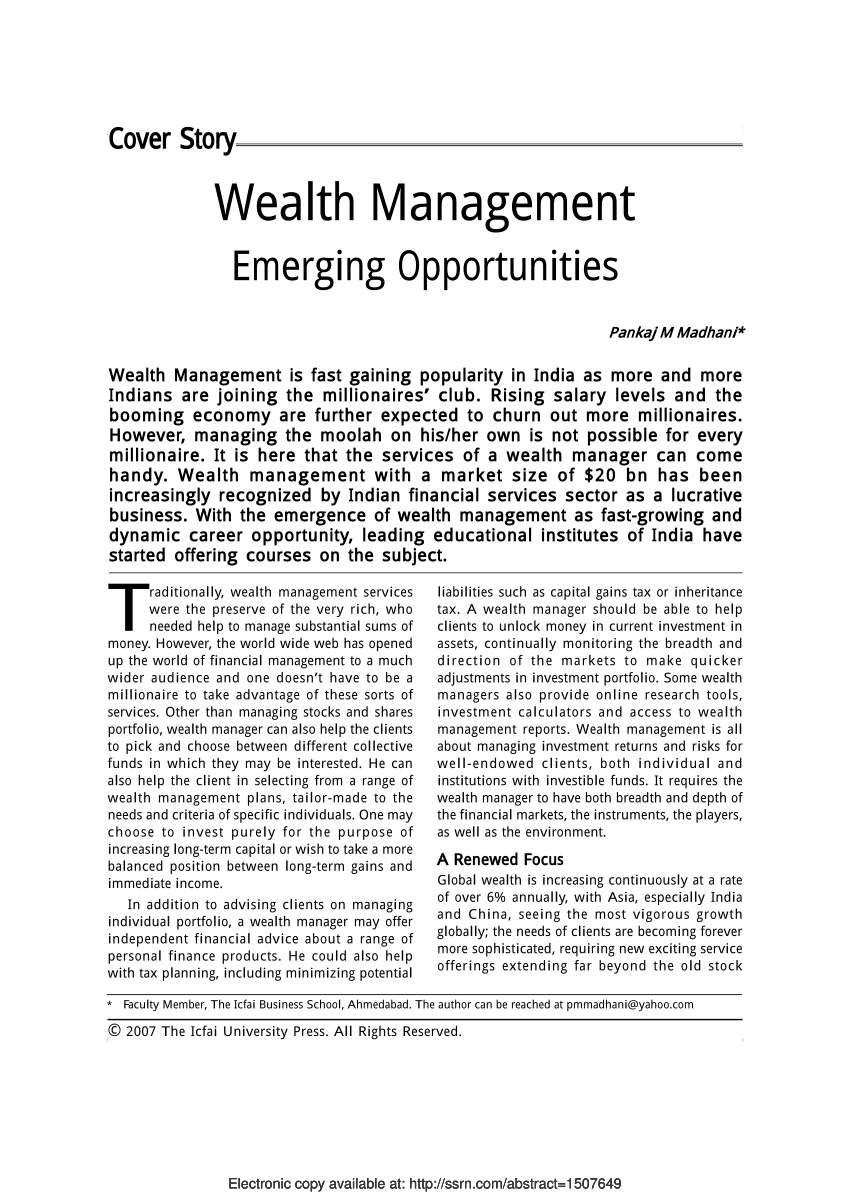
A wealth manager is a financial advisor who helps high net-worth individuals and families manage their financial affairs. They can provide everything from retirement planning and tax planning to estate or charitable giving. A wealth manager may also offer advice on investing. A wealth manager may charge more than a traditional financial advisor, depending on how large the company is. A wealth manager can charge up to 3% of clients' total assets under their management (AUM).
Wealth managers are not financial advisors. They have a fiduciary duty and must act in the best interests of their clients. When creating a plan to achieve their goals, a wealth manager must consider all factors. They should also have the ability to show expertise and years of experience in their area. They should also be able adjust their asset allocations to meet their clients' individual needs.

A wealth manager is different than a financial advisor because they offer a more personalized approach. High-net-worth people often have complicated financial situations that require a detailed plan to help them stay on track. A wealth manager can help anyone, no matter if they're saving for a wedding, setting up a business or protecting their retirement savings. The right wealth manger will take the time necessary to get to know your goals and work with you. Although it might take time before you find the right one, the result will be more informed and comprehensive.
A wealth manager can provide you with more personalized attention and access to many experts. Most are licensed professionals with bachelor or grad degrees. Additionally, the right advisor will have a fiduciary responsibility to act in the best interests of their clients.
A wealth manager is an expert in all aspects of financial matters. This includes investments, tax and succession planning, charitable giving and charitable giving. You can have your services tailored to fit your specific needs. Wealth managers can work with both the wealthy and the less fortunate. Many wealth managers have additional specialties such as money coaches or credit counselors.
A financial advisor on the other hand works with a wider variety of clients, including middle class people. Fees charged by financial advisors vary depending on the complexity of your situation. For a relatively small fee, an advisor can be your guide as you work toward meeting your financial goals.

An advisor will normally meet with you at least once per year to discuss financial goals. You can ask questions and share information during the annual review of your wealth planning. Do your background check through the FINRA website if you're considering a financial planner. Request references. It's a smart decision to make for your future by investing in a trusted advisor.
FAQ
How much debt are you allowed to take on?
It is important to remember that too much money can be dangerous. If you spend more than you earn, you'll eventually run out of cash because it takes time for savings to grow. You should cut back on spending if you feel you have run out of cash.
But how much is too much? There isn't an exact number that applies to everyone, but the general rule is that you should aim to live within 10% of your income. This will ensure that you don't go bankrupt even after years of saving.
This means that, if you have $10,000 in a year, you shouldn’t spend more monthly than $1,000. If you make $20,000 per year, you shouldn't spend more then $2,000 each month. If you earn $50,000, you should not spend more than $5,000 per calendar month.
It is important to get rid of debts as soon as possible. This applies to student loans, credit card bills, and car payments. After these debts are paid, you will have more money to save.
It's best to think about whether you are going to invest any of the surplus income. If the stock market drops, your money could be lost if you put it towards bonds or stocks. However, if the money is put into savings accounts, it will compound over time.
Consider, for example: $100 per week is a savings goal. Over five years, that would add up to $500. In six years you'd have $1000 saved. In eight years, your savings would be close to $3,000 It would take you close to $13,000 to save by the time that you reach ten.
In fifteen years you will have $40,000 saved in your savings. That's pretty impressive. But if you had put the same amount into the stock market over the same time period, you would have earned interest. You'd have more than $57,000 instead of $40,000
That's why it's important to learn how to manage your finances wisely. Otherwise, you might wind up with far more money than you planned.
What is personal financial planning?
Personal finance involves managing your money to meet your goals at work or home. This includes understanding where your money is going and knowing how much you can afford. It also involves balancing what you want against what your needs are.
If you master these skills, you can be financially independent. This means you are no longer dependent on anyone to take care of you. You no longer have to worry about paying rent or utilities every month.
It's not enough to learn how money management can help you make more money. It makes you happier overall. When you feel good about your finances, you tend to be less stressed, get promoted faster, and enjoy life more.
So who cares about personal finance? Everyone does! The most searched topic on the Internet is personal finance. According to Google Trends, searches for "personal finance" increased by 1,600% between 2004 and 2014.
Today's smartphone users use their phones to compare prices, track budgets and build wealth. These people read blogs like this one and watch YouTube videos about personal finance. They also listen to podcasts on investing.
According to Bankrate.com Americans spend on average four hours per day watching TV, listening and playing music, browsing the Internet, reading books, and talking to friends. It leaves just two hours each day to do everything else important.
You'll be able take advantage of your time when you understand personal finance.
What is the difference between passive and active income?
Passive income is when you make money without having to do any work. Active income requires effort and hard work.
When you make value for others, that is called active income. It is when someone buys a product or service you have created. Examples include creating a website, selling products online and writing an ebook.
Passive income is great because it allows you to focus on more important things while still making money. But most people aren't interested in working for themselves. Therefore, they opt to earn passive income by putting their efforts and time into it.
Passive income isn't sustainable forever. You might run out of money if you don't generate passive income in the right time.
In addition to the danger of burnout, if you spend too many hours trying to generate passive income, So it's best to start now. You'll miss out on the best opportunities to maximize your earning potential if you wait to build passive income.
There are three types to passive income streams.
-
There are many options for businesses: You can own a franchise, start a blog, become a freelancer or rent out real estate.
-
Investments - these include stocks and bonds, mutual funds, and ETFs
-
Real Estate - this includes rental properties, flipping houses, buying land, and investing in commercial real estate
How does rich people make passive income from their wealth?
There are two main ways to make money online. The first is to create great products or services that people love and will pay for. This is what we call "earning money".
The second way is to find a way to provide value to others without spending time creating products. This is "passive" income.
Let's suppose you have an app company. Your job is development apps. Instead of selling apps directly to users you decide to give them away free. It's a great model, as it doesn't depend on users paying. Instead, your advertising revenue will be your main source.
In order to support yourself as you build your company, it may be possible to charge monthly fees.
This is how the most successful internet entrepreneurs make money today. Instead of making money, they are focused on providing value to others.
What is the easiest passive source of income?
There are many online ways to make money. Many of these methods require more work and time than you might be able to spare. How can you make it easy for yourself to make extra money?
The solution is to find what you enjoy, blogging, writing or selling. It is possible to make money from your passion.
For example, let's say you enjoy creating blog posts. You can start a blog that shares useful information about topics in your niche. You can then sign up your readers for email or social media by inviting them to click on the links contained in your articles.
This is called affiliate marketing. You can find plenty of resources online to help you start. Here's a list with 101 tips and resources for affiliate marketing.
You could also consider starting a blog as another form of passive income. You'll need to choose a topic that you are passionate about teaching. Once you have established your website, you can make it a monetizable resource by selling ebooks, courses, and videos.
Although there are many ways to make money online you can choose the easiest. If you really want to make money online, focus on building websites or blogs that provide useful information.
Once you've created your website promote it through social media like Facebook, Twitter LinkedIn, Pinterest Instagram, YouTube, and many other sites. This is content marketing. It's an excellent way to bring traffic back to your website.
Why is personal finances important?
Anyone who is serious about financial success must be able to manage their finances. We live in a world that is fraught with money and often face difficult decisions regarding how we spend our hard-earned money.
Why should we save money when there are better things? Is it not better to use our time or energy on something else?
Yes and no. Yes, because most people feel guilty when they save money. It's not true, as more money means more opportunities to invest.
Focusing on the big picture will help you justify spending your money.
Controlling your emotions is key to financial success. Focusing on the negative aspects in your life will make it difficult to think positive thoughts.
Also, you may have unrealistic expectations about the amount of money that you will eventually accumulate. This could be because you don't know how your finances should be managed.
These skills will allow you to move on to the next step: learning how to budget.
Budgeting is the act of setting aside a portion of your income each month towards future expenses. Planning will save you money and help you pay for your bills.
Now that you understand how to best allocate your resources, it is possible to start looking forward to a better financial future.
Statistics
- Mortgage rates hit 7.08%, Freddie Mac says Most Popular (marketwatch.com)
- Etsy boasted about 96 million active buyers and grossed over $13.5 billion in merchandise sales in 2021, according to data from Statista. (nerdwallet.com)
- U.S. stocks could rally another 25% now that Fed no longer has ‘back against the wall' in inflation fight (marketwatch.com)
- While 39% of Americans say they feel anxious when making financial decisions, according to the survey, 30% feel confident and 17% excited, suggesting it is possible to feel good when navigating your finances. (nerdwallet.com)
- 4 in 5 Americans (80%) say they put off financial decisions, and 35% of those delaying those decisions say it's because they feel overwhelmed at the thought of them. (nerdwallet.com)
External Links
How To
Get passive income ideas to increase cash flow
There are ways to make money online without having to do any hard work. Instead, there are ways for you to make passive income from home.
Automation could also be beneficial for an existing business. You might be thinking about starting your own business. Automating certain parts of your workflow may help you save time as well as increase productivity.
The more automated your company becomes, the more efficient you will see it become. This means you will be able to spend more time working on growing your business rather than running it.
A great way to automate tasks is to outsource them. Outsourcing allows your business to be more focused on what is important. Outsourcing a task is effectively delegating it.
This allows you to concentrate on the core aspects of your company while leaving the details to someone else. Outsourcing makes it easier to grow your business because you won't have to worry about taking care of the small stuff.
A side hustle is another option. It's possible to earn extra cash by using your skills and talents to develop a product or service that is available online.
Articles are an example of this. There are plenty of sites where you can publish your articles. These sites allow you to earn additional monthly cash because they pay per article.
It is possible to create videos. You can upload videos to YouTube and Vimeo via many platforms. These videos can drive traffic to your website or social media pages.
Another way to make extra money is to invest your capital in shares and stocks. Stocks and shares are similar to real estate investments. You get dividends instead of rent.
These shares are part of your dividend when you purchase shares. The amount of the dividend depends on how much stock you buy.
If you decide to sell your shares, you will be able to reinvest the proceeds into new shares. This will ensure that you continue to receive dividends.